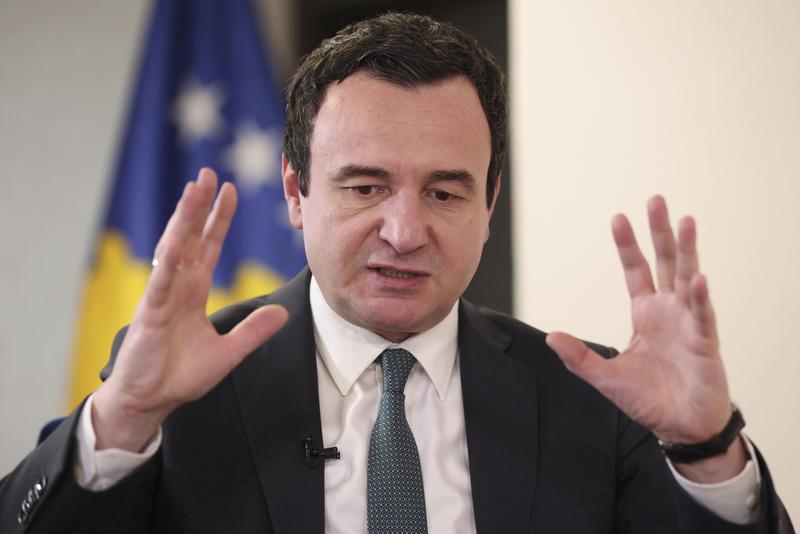 Kosovo's Prime Minister Albin Kurti speaks during an interview with The Associated Press in capital Pristina, Kosovo, Feb 5, 2023. (PHOTO / AP)
Kosovo's Prime Minister Albin Kurti speaks during an interview with The Associated Press in capital Pristina, Kosovo, Feb 5, 2023. (PHOTO / AP)
PRISTINA - Kosovo's prime minister Albin Kurti said on Monday he accepted a proposed European Union plan aimed at normalizing relations with Serbia despite concerns over Western demands to give more rights to local Serbs that have so far hindered a peace deal.
Last month Western envoys told Kosovo and Serbia they should state whether they accept an 11-point plan meant to defuse tensions lingering since the 1998-99 war or face repercussions from the EU and United States.
Kosovo declared independence from Serbia in 2008, a decade after a guerrilla uprising against Belgrade's rule. Over the past decade the two have been holding normalization talks under EU mediation, with their success key for Pristina's and Belgrade's aspirations to join the wealthy bloc.
The proposed 11-point deal would not require Serbia to recognize the independence of its former province, but Belgrade would have to stop lobbying against Kosovo's membership in international bodies
The 11-point plan calls for implementation of past deals, including the creation of an association of semi-autonomous Serb-majority municipalities that Kurti has opposed, saying it would effectively partition the country along ethnic lines, a criticism rejected by Western mediators.
ALSO READ: Kosovo reopens border crossing with Serbia, easing standoff
"We do accept the EU proposal for normalization of relations between Kosovo and Serbia, and consider it a good basis for further discussion and a solid platform for moving forward," Kurti tweeted after meeting EU's envoy Miroslav Lajcak in Pristina.
"Certain questions on international guarantees, implementation mechanisms and time sequencing will be addressed soon during the Brussels talks ahead."
Last week, Kurti said he might be willing to take into consideration the formation of the association, but only if it complied with Kosovo's constitution and was not based solely on ethnic grounds.
READ MORE: Kosovo, Serbia reach deal to end dispute over car plates
Kosovo in 2013 pledged to give more autonomy to local Serbs, who refuse to recognize its 2008 independence, through such an association as part of a peace deal. However, Kosovo's highest court said some parts of the deal violated the constitution and should be changed before it takes effect.
The proposed 11-point deal would not require Serbia to recognize the independence of its former province, but Belgrade would have to stop lobbying against Kosovo's membership in international bodies.
The two countries would also have to open representative offices in each other's capitals and work on resolving outstanding issues.
ALSO READ: Serbia president: Belgrade seeks to defuse tensions in Kosovo
Ethnic Serbs account for around 100,000 of Kosovo's 1.8-million population, with about half of them living in the north of the country and most refusing to recognize Pristina's authority.
Serbia's President Aleksandar Vucic told parliament last week that Western envoys warned Belgrade that if Serbia did not accept the proposal, its EU membership talks would be halted and access to pre-accession funds and investments denied.


